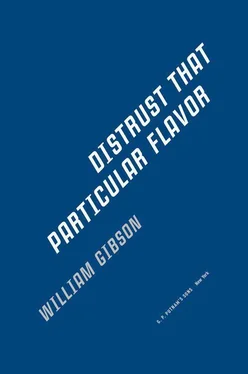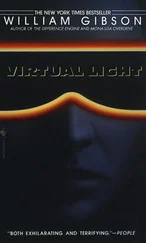The heterosexual hand-job business has been treated rather differently, and one can only assume that it was seen to possess some genuine degree of importance in the national Confucian scheme of things. Most shopping centers currently offer at least one “health center”—establishments one could easily take for slick mini-spas, but which in fact exist exclusively to relieve the paying customer of nagging erections. That one of these might be located between a Reebok outlet and a Rolex dealer continues to strike me as evidence of some deliberate social policy, though I can’t quite imagine what it might be. But there is remarkably little, in contemporary Singapore, that is not the result of deliberate and no doubt carefully deliberated social policy.
Take dating. Concerned that a series of earlier campaigns to reduce the national birth rate had proven entirely too successful, Singapore has instituted a system of “mandatory mixers.” I didn’t find this particularly disturbing, under the circumstances, though I disliked the idea that refusal to participate is said to result in a “call” to one’s employer. But there did seem to be a certain eugenic angle in effect, as mandatory dating for fast-track yuppies seemed to be handled by one government agency, while another dealt with the less educated. Though perhaps I misunderstood this, as Singaporeans seemed generally quite loath to discuss these more intimate policies of government with a curious foreign visitor who was more than twice as tall as the average human, and who sweated slowly but continuously, like an aged cheese.
Singapore is curiously, indeed gratifyingly devoid of certain aspects of creativity. I say gratifyingly because I soon found myself taking a rather desperate satisfaction in any evidence that such a very tightly run ship would lack innovative élan.
So, while I had to admit that the trains did indeed run on time, I was forced to take on some embarrassingly easy targets. Contemporary municipal sculpture is always fairly easy to make fun of, and this is abundantly true in Singapore. There was a pronounced tendency toward very large objects that resembled the sort of thing Mad magazine once drew to make us giggle at abstract art: ponderous lumps of bronze with equally ponderous holes through them. Though perhaps, like certain other apparently pointless features of the cityscape, these really served some arcane but highly specific geomantic function. Perhaps they were actually conduits for feng shui, and were only superficially intended to resemble Henry Moore as reconfigured by a team of Holiday Inn furniture designers.
But a more telling lack of creativity may have been evident in one of the city’s two primal passions: shopping. Allowing for the usual variations in price range, the city’s countless malls all sell essentially the same goods, with extraordinarily little attempt to vary their presentation. While this is generally true of malls elsewhere, and in fact is one of the reasons people everywhere flock to malls, a genuinely competitive retail culture will assure that the shopper periodically encounters either something new or something familiar in an unexpected context.
Singapore’s other primal passion is eating, and it really is fairly difficult to find any food in Singapore about which to complain. About the closest you could come would be the observation that it’s all very traditional fare of one kind or another, but that hardly seems fair. If there’s one thing you can live without in Singapore, it’s a Wolfgang Puck pizza. The food in Singapore, particularly the endless variety of street snacks in the hawker centers, is something to write home about. If you hit the right three stalls in a row, you might decide these places are a wonder of the modern world. And all of it quite safe to eat, thanks to the thorough, not to say nitpickingly Singaporean auspices of the local hygiene inspectors, and who could fault that? (Credit, please, where credit is due.)
But still. And after all. It’s boring here. And somehow it’s the same ennui that lies in wait in any theme park, but particularly in those that are somehow in a too aggressively spiffy state of repair. Everything painted so recently that it positively creaks with niceness, and even the odd rare police car sliding past starts to look like something out of a Chuck E. Cheese franchise…. And you come to suspect that the reason you see so few actual police is that people here all have, to quote William Burroughs, “the policeman inside.”
And what will it be like when these folks, as they so manifestly intend to do, bring themselves online as the Intelligent Island, a single giant data-node whose computational architecture is more than a match for their Swiss-watch infrastructure? While there’s no doubt that this is the current national project, one can’t help but wonder how they plan to handle all that stuff without actually getting any on them? How will a society founded on parental (well, paternal, mainly) guidance cope with the wilds of X-rated cyberspace? Or would they simply find ways not to have to? What if, while information elsewhere might be said to want to be free, the average Singaporean might be said to want, mainly, not to rock the boat? And to do very nicely, thank you, by not doing so?
Are the faceless functionaries who keep Shonen Knife and Cosmo out of straying local hands going to allow access to the geography-smashing highways and byways of whatever the Internet is becoming? More important, will denial of such access, in the coming century, be considered even a remotely viable possibility by even the dumbest of policemen?
Hard to say. And therein, perhaps, lies Singapore’s real importance. The overt goal of the national IT2000 initiative is a simple one: to sustain indefinitely, for a population of 2.8 million, annual increases in productivity of three to four percent.
IT, of course, is “information technology,” and we can all be suitably impressed with Singapore’s evident willingness to view such technology with the utmost seriousness. In terms of applied tech, they seem to have an awfully practical handle on what this stuff can do. The National Computer Board has designed an immigration system capable of checking foreign passports in thirty seconds, resident passports in fifteen. Singapore’s streets are planted with sensor loops to register real-time traffic; the traffic lights are computer controlled, and the system adjusts itself constantly to optimize the situation, creating “green waves” whenever possible. A different sort of green wave will appear if a building’s fire sensor calls for help: Emergency vehicles are automatically green-lighted through to the source of the alarm. The physical operation of the city’s port, constant and quite unthinkably complex, is managed by another system. A “smart-card” system is planned to manage billings for cars entering the Restricted Zone. (The Restricted Zone is that part of central Singapore which costs you something to enter with a private vehicle. Though I suspect that if, say, Portland were to try this, the signs would announce the “Clean Air Zone,” or something similar.)
They’re good at this stuff. Really good. But now they propose to become something else as well: a coherent city of information, its architecture planned from the ground up. And they expect that whole highways of data will flow into and through their city. Yet they also seem to expect that this won’t affect them. And that baffles us, and perhaps it baffles the Singaporeans that it does.
Myself, I’m inclined to think that if they prove to be right, what will really be proven will be something very sad; and not about Singapore, but about our species. They will have proven it possible to flourish through the active repression of free expression. They will have proven that information does not necessarily want to be free.
Читать дальше










